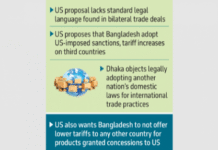CHITTAGONG, Sep 4: The country spends about Tk 9.0 billion a year in foreign exchange on account of fertilizer import from international market the price of which is more than double the local factory rate.
The above estimated amount is drained out of the country every year as the government is procuring fertilizer at Tk 38,589 per metric tonne (MT) at international market price while it is now available at Tk 14,000 from the state-owned factories.
The government has recently reduced the price of urea by Tk 4 per kilogram (KG) and refixed the procurement price of BCIC (Bangladesh Chemical Industries Corporation) at Tk 14,000 per MT. “The
government is paying a sum of Tk 24,000 more on import of one tonne of fertilizer from external sources,” a senior official at the CUFL (Chittagong Urea Fertilizer Ltd) said.
In the period between July 1 and August 21 of the current fiscal year the factories under the BCIC have produced 44,700 MT of fertilizer while it imported 39,893 MT including 1412 MT from KAFCO (Karnaphuli Fertilizer Co) at international prices, he said.
The total demand of fertilizer in Bangladesh is 2.8 million MT against the national production capacity of 2.3 million MT annually.
Production in all the five major fertilizer factories in the public sector and multinational company KAFCO was suspended for over six months in this calendar year. KAFCO started its production of fertilizer and ammonia from August 12. It requires 57 MMCFT of gas a day to run the industry.
Recently the Prime Minister has instructed the authorities concerned to restore supply of fossil gas, raw material of the plants, from August 12.
Energy adviser to PM had decided in a meeting in the ministry in March last that the supply of gas would be restored in fertilizer factories, sources said.
On July 28 last, a six-member committee of parliamentarians inspected the CUFL and reported to the authorities concerned that gas supply to the CUFL should be restored immediately because the machinery is getting spoiled for non-use for long time.
The machinery of the CUFL, imported from Japan, is highly sophisticated and prone to decay due to lack of operation. The parliamentary committee suggested restoration of gas supply especially to the CUFL at the earliest. They have also suggested rationing of gas for six months to CUFL and another six months to the KAFCO.
Khan Tipu Sultan, Moinuddin Ahmed Khan Badal, SK Abu Baker and Biren Sikdar made the suggestions to the Ministry, CUFL sources said.
A senior official of the Karnaphuli Gas Distribution Co said they could not provide gas to CUFL as the gas it requires is yet to be available from the national grid. The CUFL needs 47 million cubic feet of gas a day, he said.
When contacted, managing director of CUFL Abu Jamal Sarkar told the FE that he has been in constant contact with the Minister for Industries and BCIC chairman.
“We have urged the authorities to save the CUFL by keeping it operational for at least six month a year, otherwise the machinery will be inoperative shortly,” he said.
Labour leaders at the CUFL said the gas distribution authority in Chittagong has deprived the state-own plant of the gas supply in spite of the PM’s special initiatives to restore gas supply to five fertilizer factories.
Gas supply to CUFL was fully snapped on January 15 last gas supply to all the four factories except CUFL have been restored. CUFL was deprived of gas supply for 250 days every year on average in the last four years since 2009-10, they stated.
“Due to suspension of production in the CUFL for years the country is counting an extra import cost of fertilizer at Tk 34.8 million which has stood at Tk 24 billion in the last four years,” said Ziauddin Mahmud, convener of CUFL Workers’ Movement for Restoration of Gas.
Gas-hungry industries, on the other hand, are demanding the fossil as they are running out of required amount of gas causing severe production shortage in plants, especially the nation’s major steel re-rolling industries which contribute immensely to the infrastructure and communication sectors.
Source: Thefinancialexpress









